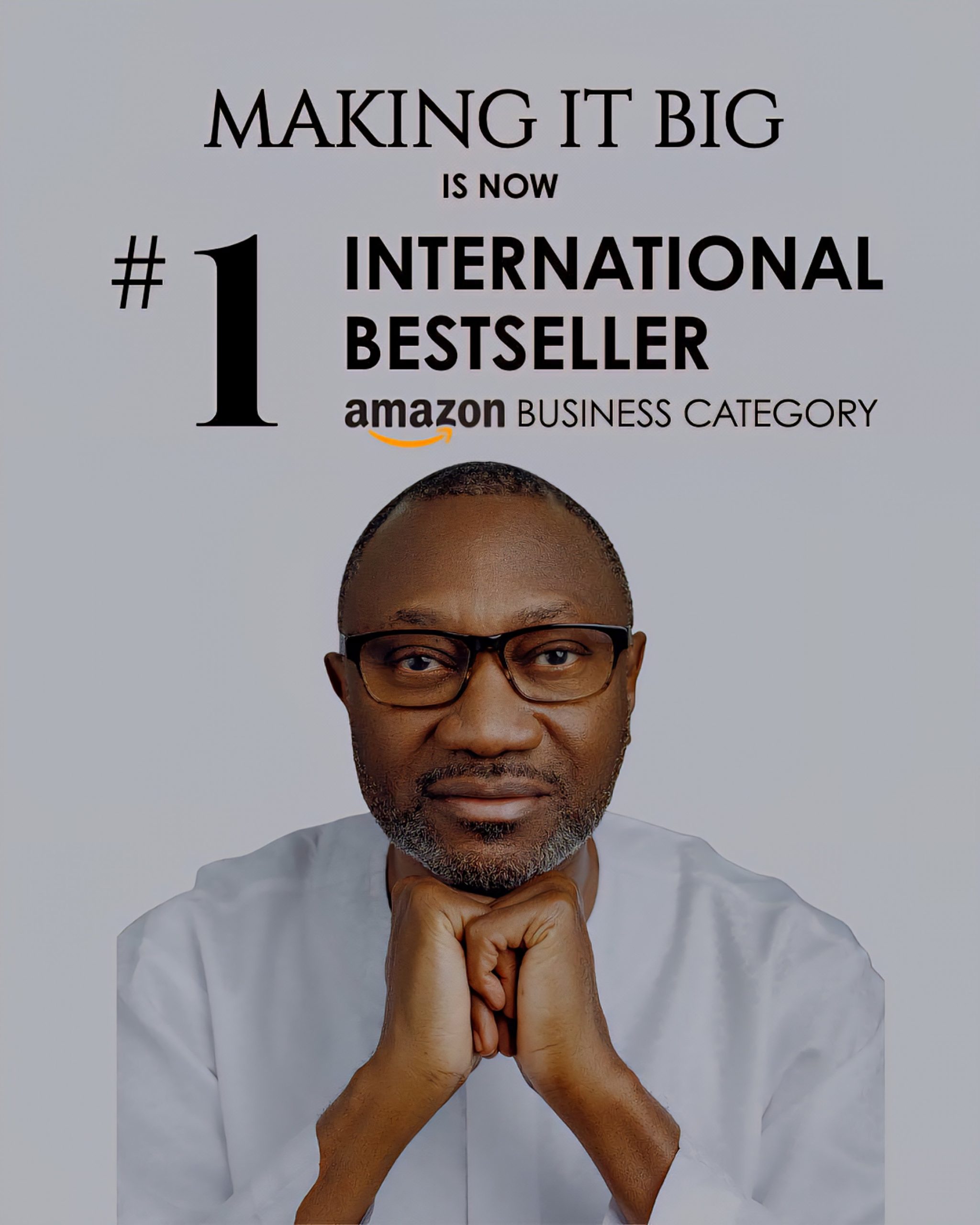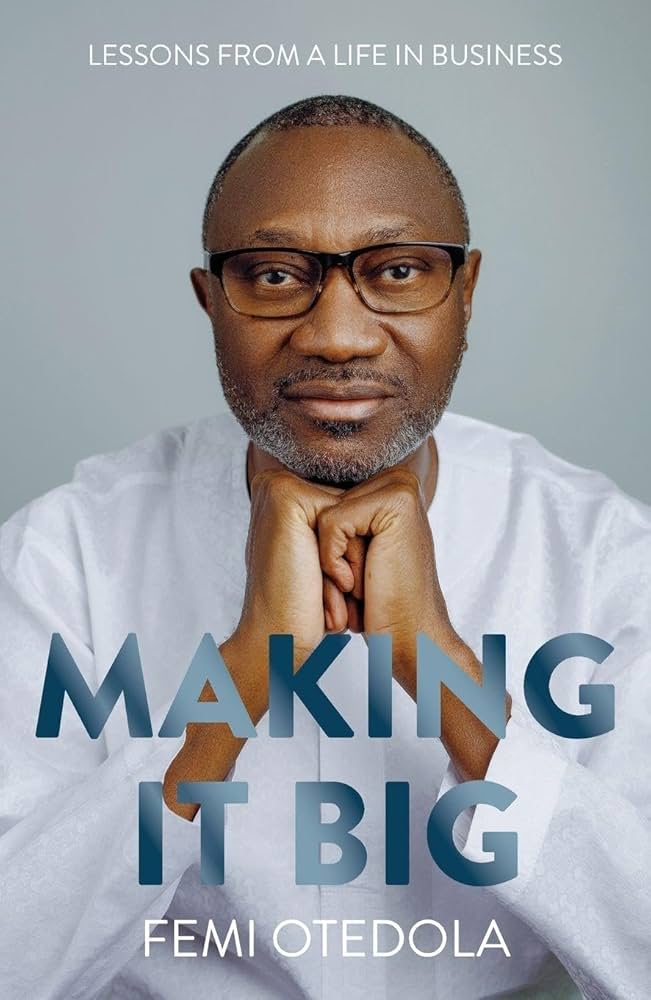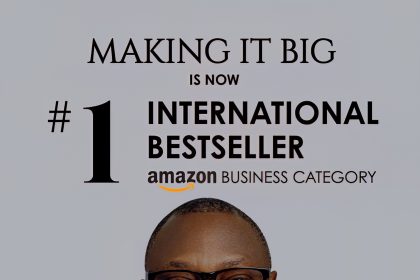
…made first billion at the age of 41, self-made entrepreneur and Forbes-rated Africa’s greatest philanthropist of all time, irrespective of your colour, nationality, language
*Shows Setback is Not an End to Life, but a Catalyst for comeback to the Top, owns properties in Lagos, Dubai, London, New York and Monaco
*“It is a compelling and transformative entrepreneurial journey that effectively unpacks useful insights for surmounting business hurdles, connecting corporate dots for budding entrepreneurs”-Alhaji ALIKO Dangote, President Dangote Group
*“It is one of the most important books you will ever read on entrepreneurship in a developing country”–ARUNMA Oteh, Former DG, SEC/Vice President & Treasurer, World Bank
*“The book as a must-read for all business leaders, policymakers and young people venturing into the world of entrepreneurship and business”-Dr. AKINWUNMI Adesina, President of Africa Development Bank Group
*“It is one of the very few books by successful African business leaders documenting their journey and sharing lessons learned for posterity, for a young generation” -Dr. NGOZI Okonjo-Iweala, DG, World Trade Organisation/Former Minister of Finance & Coordinating Minister of the Economy of Nigeria
*“The 286-page business memoir of the Chairman of First HoldCo Plc and Geregu Power Plc are compelling, captivating, and inspirational. Just as the Constitution is a guide to citizens, Holy Book-a guide to walking in the Creator’s will, Making It Big is like the air an entrepreneur breathe for that business to stay active, alive”-EDITORIAL Board, NAIJA Standard Newspaper Inc USA
*BY DR GEORGE ELIJAH OTUMU, Executive Editor & Group Managing Director, NAIJA STANDARD NEWSPAPER Inc USA
HE’S regarded as one of Africa’s richest men for his simplicity, vision, most creative business acumen and ‘out-of-the-box’ thinker. In the black community around the world, many regard this soft-spoken entrepreneur Nigerian born billionaire who made his first billion at the age of 41, a disruptor of status-quo who readily confronts challenges and overcomes no matter how tough. Welcome to the world of OLUFEMI PETER OTEDOLA, a man conferred with the prestigious national title of ‘Commander of the Order of the Niger’, CON, to whom the business sector addresses simply by his first and last name.
It is incontrovertible that Femi is one of Africa’s greatest philanthropists, a self-made entrepreneur and Forbes-rated billionaire who dreamt of his first business before he was ten years old.
It is strongly believed that Napoleon Hill, a great philosopher had Femi in mind by the famous quote: “A quitter never wins, and a winner never quits”. It is truism from the philosophy that success comes from perseverance and determination; those who give up before achieving their goals are unlikely to succeed, while those who persist through challenges are more likely to find success. This mindset encourages resilience and a willingness to learn from setbacks, transforming failures into stepping stones rather than insurmountable obstacles.
That brings the narrative to the latest trending global memoir which brings to the fore the unpublished business secrets of Femi, titled ‘Making It Big: Lessons from a Life in Business’ on sale between ₦15,000.00-₦25,000.00’. This cerebral businessman has proven repeatedly overtime that setback is not an end to life, but a catalyst to the top, owning properties in Lagos, Dubai, London, New York and Monaco and holds shares in Zenith Bank and FBN Holdings.
Femi, in the book, a self-made entrepreneur and Forbes-rated billionaire, rated Africa’s greatest philanthropist of all times, showed he is a masterclass in attaining and maintaining a positive mindset and a reminder that it is possible to defy the odds, no matter how stacked they are against you.
The book ‘Making It Big: Lessons from a Life in Business’ is a memoir by Femi Otedola, an influential Nigerian business tycoon who shared his journey from childhood dreams of business to becoming a billionaire. It offers personal reflections, practical insights, and a glimpse into the strategies and values that shaped his career, with books available from Nigerian sellers in the specified price range.

The former chairman of Forte Oil PLC, and current executive chairman of Geregu Power PLC., who made his first fortune in commodities before selling his shares in Forte Oil to invest in the energy business explained in the memoir that the book charts his ambition, hard work, successes, challenges and setbacks – from making a billion, to losing a billion to making it back again and, as one of Africa’s richest men, settling into a philanthropic role to give back to the continent.
Femi, who hail from one of Nigeria’s prominent families, is the son of the late Sir Michael Otedola, former governor of Lagos State, and Lady Doja.
He revealed that his vision transformed Forte Oil PLC into one of the highest performing companies on the Nigerian Stock Exchange, which grew exponentially to become a model of possibilities inherent in Nigeria, winning accolades, and crucially becoming the investment of choice within the Oil and Gas Industry, including the Nigerian Stock Exchange. He is a business magnate, who founded Zenon Petroleum and Gas Ltd and owner of several other businesses across shipping, real estate and finance.
Unarguably, his contributions to the growth of the Nigerian economy attracted the national attention, when, as earlier stated above, he was awarded CON in May 2010 and is the current Chancellor of Augustine University in Ilara, Epe, Lagos State.
Femi has held several board memberships from president of the Nigerian Chamber of Shipping; past chairman of Transcorp Hilton Hotel, Abuja; member of the Governing Council of the Nigerian Investment Promotion Council, member of the National Economic Management Team and Honorary International Investors Council under the leadership of Baroness Lynda Chalker.
Certainly, he is a philanthropist at heart with strong value, keen involvement in educational causes. He has continuously demonstrated his passion for his community, Epe, Lagos State, and Nigeria, through generous donations supporting financially disadvantaged students via the Sir Michael Otedola Scholarship Awards Foundation. In November, he donated $14m (USD) to the Save the Children Fund, supporting programmes for destitute children in the north-eastern region of Nigeria. He is the vice-president of Save the Children UK.
Don’t forget that Nigeria’s oil and gas industry was until the late 1990s dominated by non-Nigerians as evinced by the late Marc Rich.
And when Femi made the all-important decision to pivot from his loan business to the downstream sector of the oil and gas industry, folks like Jean-Claude Meyer of Marca were market leaders and the ones who had allocation directly from the Nigerian National Petroleum Corporation, while Mobile, AP and Texaco were the players whose petrol stations adorned our high streets.
Owing to his antecedents in running his father’s printing business, our protagonist had honed his entrepreneurial instincts at…
And however disappointed Sir Michael must have been with his second son’s decision to drop out of secondary school, you’re left with the abiding impression that the patriarch was sufficiently impressed by his progeny’s grasp of the intricacies of business, to the point that he made Femi, the Managing Director, at 25.
Their relationship is at the heart of this book, and this is evinced by the evolution of the dynamic between father and son to mentor/mentee and most importantly, political advisor and personal aide.
Without an iota of lies, ‘Making It Big is a masterclass in attaining and maintaining a positive mindset and a reminder that it is possible to defy the odds, no matter how stacked they are against you. The memoir is packed with personal philosophies and business lessons. This is why it is a book of hope, backed up by solutions, written to inspire entrepreneurs in Africa and from everywhere.
Interestingly, barely a few days ago on twitter, the billionaire Oil magnate presented a gift to his daughter and her husband on their wedding day, and it was a copy of his book. ‘Making It Big”. He did that so the young couple could learn the unpublished trade secret of becoming successful entrepreneurs in their businesses.
Going through the gilded pages of ‘Making It Big: Lessons from a Life in Business’ the highly intelligent billionaire oil magnate turned literary maestro, released on August 18, 2025, this part-memoir, part-business gospel, more as a book and a front-row ticket to the high-stakes circus of African entrepreneurship.
Femi, a Forbes-rated billionaire who dreamed of business empires before he could spell “profit,” serves up a 298-page cocktail of ambition, setbacks, and triumphs that reads like a blockbuster. From his childhood hustle offering manicures to family guests.
The memoir offers far more than the typical rags-to-riches or boardroom drama narrative. It rather opens a candid window into the complex interplay between politics, business, and the volatile oil market in Nigeria. At its heart lies one of the most striking episodes in the country’s recent economic history-the deregulation of diesel importation in 2004-and the fiery exchange between the oil magnate and former President Olusegun Obasanjo.
The recollection is raw, unpolished, and without the varnish of retrospective diplomacy. According to Femi, Obasanjo’s outburst-calling him a “stupid boy” and invoking divine punishment-came in the wake of a national diesel scarcity that the president believed was caused, or at least worsened, by Femi’s influence in policy direction.
In reconstructing the scene, Femi does not merely revel in the drama; he uses it as a prism to explore how market deregulation, while theoretically designed to create efficiency and competition, can also trigger supply shocks when state oversight is removed too abruptly.
His version of events suggests that in 2004, the shift from government-controlled pricing and distribution to open importation was not accompanied by the institutional safeguards and logistics planning that Nigeria’s downstream oil sector desperately needed. In the diesel market, deregulation meant freedom for traders to import and sell at competitive prices, but it also opened the floodgates to speculative hoarding, price volatility, and uneven distribution-issues that were compounded by Nigeria’s infrastructural weaknesses.
The memoir situates Femi’s business maneuvers in this policy environment, portraying him as both a participant and a lightning rod in the unfolding drama. He recounts how his company, Zenon, became a key player in diesel supply at a time when Nigeria’s economy, driven by its booming telecommunications and industrial sectors, was becoming ever more dependent on diesel-powered generators due to chronic electricity shortages. The deregulation decision, in his telling, was an opportunity-but also a gamble-given the volatility of global oil prices and Nigeria’s own capacity bottlenecks. When scarcity hit, public anger was palpable, and political blame was swift.
Evaluating ‘Making It Big’, it is easier to see how Femi balances self-justification with business philosophy. He defends deregulation as an inevitable step for Nigeria to modernize its oil sector, arguing that long-term market liberalization benefits outweigh the short-term pains. Yet, he also underlines how the Nigerian state often underestimates the need for transition mechanisms-buffer stocks, transparent import licensing, robust transport and storage infrastructure-that can cushion the immediate impact on the public. His account of Obasanjo’s fury captures the political dimension of economic reform, where policy architects are quick to seek scapegoats when reforms meet turbulence.
Of course, the memoir’s strength lies in this unfiltered depiction of the political-business interface. Femi does not sanitize the language or the emotions. Obasanjo’s harsh words, recorded without softening, serve as a reminder that in Nigeria, business leaders in strategic sectors are not mere private actors; they are perceived as custodians of national economic stability. The exchange also underscores how deregulation debates in Nigeria are never just about economics-they are about trust, control, and the public’s fragile relationship with both government and private capital.
‘Making It Big’ succeeds in weaving personal narrative with economic history, by his lucid prose that is almost confrontational, mirroring the high-stakes nature of the events. The confrontation with Obasanjo is not just anecdote-it is emblematic of the larger theme of the book: that success in Nigeria’s business environment requires navigating a minefield where politics, perception, and performance are inseparably intertwined. The fact that he is willing to recount an episode in which he was publicly humiliated suggests a calculated vulnerability, aimed at underscoring the resilience needed to survive in the Nigerian marketplace.
A broader economic standpoint showcases Femi’s retelling prompts critical reflection on Nigeria’s approach to deregulation. Diesel, unlike petrol, has long been the lifeblood of industries, commercial transport, and private power generation. A shortage is not simply an inconvenience-it can paralyze factories, cripple logistics, and inflate operating costs across the economy. The 2004 scarcity exposed the systemic risks of introducing market freedom without ensuring supply security. For policymakers, the lesson is clear: deregulation must be accompanied by a parallel strengthening of supply chains, anti-hoarding regulations, and market monitoring mechanisms to prevent abuse.
In the end, this episode in ‘Making It Big’ is more than a clash of egos; it is a snapshot of Nigeria’s perpetual struggle to reconcile market liberalization with social stability. Femi emerges from his own telling as a shrewd but embattled player-one who understood the opportunities deregulation offered, but who also bore the brunt of its early missteps.
Fact is, whether the reader sympathizes with him or not, the account forces us to confront the uncomfortable truth that in Nigeria’s oil economy, policy shifts can turn heroes into villains overnight, and that the real test of leadership-whether political or corporate-lies in managing the storms that inevitably follow change.
If this section is any indication, Femi’s memoir will be both a lightning rod and a mirror-provoking debate, exposing fault lines, and reminding Nigerians that in the high-wire act of oil politics, no one stands far from the fire.
It could be recalled that during 2022 and 2023 Femi sold down a Geregu stake that was once more than 95% to bring on institutional investors.
Investors in Geregu include the Nigerian government, the Afrexim Fund for Export Development in Africa and the State Grid Corporation of China.
*Below are the testimonials of great Africans who are captains of industries in the world, still learning from the business nuggets provided by Femi.
*Testimonials:
For Alhaji Aliko Dangote, President Dangote Group, he said of the book, “It is a compelling and transformative entrepreneurial journey that effectively unpacks useful insights for surmounting business hurdles, connecting corporate dots for budding entrepreneurs”.
Prince SAMUEL Adedoyin, Founder/Chairman of Doyin Group of Companies corroborated this view, by saying: “The memoir is an accurate guide to establishing a successful business and life in general”.
Adding to the elite lists of VIPs applauding the accomplishments of Femi is Arunma Oteh, Former DG, SEC/Vice President & Treasurer, World Bank, who said: “It is one of the most important books you will ever read on entrepreneurship in a developing country”.
Dr. Akinwunmi Adesina, President of Africa Development Bank Group added his voice in the review, “The book as a must-read for all business leaders, policymakers and young people venturing into the world of entrepreneurship and business”.
Dr. Ngozi Okonjo-Iweala, DG, World Trade Organisation/Former Minister of Finance & Coordinating Minister of the Economy of Nigeria brought her full weight behind the memoir when she penned: “It is one of the very few books by successful African business leaders documenting their journey and sharing lessons learned for posterity, but in particular for a young generation”.
For the Editorial Board of Naija Standard Newspaper Inc USA, Africa’s most read, credible, international online news medium in North America, after a thorough review came to the following conclusions: “The 286-page business memoir of the Chairman of First HoldCo Plc and Geregu Power Plc are compelling, captivating, and inspirational. Just as the Constitution is a guide to citizens, Holy Book-a guide to walking in the Creator’s will, Making It Big is like the air an entrepreneur breathe for that business to stay active, alive”–EDITORIAL Board, NAIJA Standard Newspaper Inc USA
DONATE TO HELP BUILD A SPECIAL APPS FOR JOURNALISTS AGAINST LIVER ELEVATION & KIDNEY FAILURE:
CERTAINLY, Good journalism costs a lot of money. Without doubt, only good journalism can ensure the possibility of a good society, an accountable democracy, and a transparent government. We are ready to hold every corrupt government accountable to the citizens. To continually enjoy free access to the best investigative journalism in Nigeria, we are requesting of you to consider making a modest support to this noble endeavor.”
By contributing to NAIJA STANDARD NEWSPAPER, you are helping to sustain a journalism of relevance and ensuring it remains free and available to all without fear or favor.
Your donation is voluntary — please decide how much and how often you want to give. For offline donation, email: letters@nigeriastandardnewspaper.com or call +2347076577445 (Nigeria) or WhatsApp American Roaming Mobile Number: +16825834890 (United States of America)
donation



